- Home
- Jane Peart
Senator's Bride Page 2
Senator's Bride Read online
Page 2
Although the house was unoccupied now, Lynette suspected that spending time there was her brother's way of holding on to all they had lost.
Lynette moved among the crowd, stopping to speak to people she knew, catching snatches of conversation, much of it a discussion of some of the political issues of the day. A recent local election had captured the attention of most of the men, and some of the ladies were commenting about the much-debated amendment to the Constitution, giving women the right to vote. How boring! Lynette thought. At her school, the top priority among her fellow classmates was not current events but whom to invite to the next party!
Her gaze circled the room, lingering on a young man who stood talking with her uncle Scott Cameron, Kitty's brother. Recognizing who it was immediately, her pulse began to race. Frank Maynard.
Lynette had first met Frank several years ago, while attending a church in Mayfield with her grandmother and Scott. The three were leaving after the service when Scott called to someone just ahead of them. The man turned around, his face breaking into a wide smile. "Scott!"
Lynette and her grandmother paused as the two men moved to greet each other. Standing a little apart, Lynette observed the man. He was not quite as tall as Scott, trimly built, with light brown hair and neat features. It was his smile, however, and his fine gray eyes that gave him a distinctive appeal.
Scott pumped his hand. "When did you get back?"
"A few weeks ago. I'm setting up law offices in Mayfield and getting ready to move back into the old family homeplace." Then, over Scott's shoulder, Lynette's eyes met his, and suddenly she was glad she had worn her blue eyelet dress and the new straw hat trimmed with cornflowers.
"Come over and say hello to Mother, Frank," Scott was saying. "And I don't believe you've ever met my cousin, Lynette Montrose."
Lynette could not remember much about the introduction or the few pleasantries that followed. She did, however, recall Frank's firm handshake, the feel of his palm on hers through her lace mitts. Then she was in the carriage, and they were on their way home to Cameron Hall.
"You must have dinner with us sometime soon, Mr. Maynard," Blythe said graciously.
"That would be my pleasure, Mrs. Cameron."
"Let us know when you're settled, and we'll fix a date."
I'll look forward to that, thank you." Frank's eyes again rested briefly on Lynette before he said goodbye.
The next Sunday, hoping to see Frank Maynard at church, Lynette had even rehearsed something to say to him, something he might think witty or clever. But when she had scanned the congregation for him, he was nowhere to be found. Nor did he appear the next Sunday or the one after that. Since she didn't want to appear overly interested, she had resisted the impulse to mention Frank Maynard to Scott but had listened for any information she might glean through casual conversation. However, by the time it came up, the summer was almost over and it was time for her to return to school.
Lynette had realized that it was silly to let a chance meeting make such a lasting impression. In spite of that, she had found herself fantasizing other meetings, other imaginary conversations with Frank Maynard. Of course, Frank was a much older man, probably almost as old as Scott! Somehow, that very fact had made him even more intriguing. From the little she had been able to learn, she knew that Frank, from an old Mayfield family, had served as an aide to a colonel and had been stationed in Washington, D.C., first, and then in London during the War.
When she was back at boarding school, Frank began to appear frequendy in Lynette's thoughts and daydreams. At Dunbarton Academy social life was restricted. Even the monthly tea dances, attended by boys from the nearby prep school, were boring because the guests all seemed so hopelessly juvenile compared to Frank. Lynette found herself imagining unexpected meetings and romantic rendezvous with the dashing older man.
Since Frank had become almost a fantasy figure, seeing him in person now was quite a shock. As she stood there staring, he caught sight of her, smiled, and started toward her. For some reason she could not explain, her reaction was to whirl around and hurry away in the other direction. Her ridiculous behavior was impossible for even her to understand. What a fool Frank must think her!
Looking for a possible refuge where she could compose herself, Lynette glanced into the music room. There, under one of the several bunches of mistletoe tied with green and red satin ribbons, was a couple locked in an embrace, kissing under the mistletoe!
Not wishing to intrude on their privacy, Lynette backed away. As she swiveled into the hallway again, she collided with a gentleman.
Embarrassed, she moved away from the starched and pleated white-shirt front. Without lifting her eyes to see who it was, she stammered an apology. "Oh, I'm so sorry! Pardon me, I didn't see. . . ."
Strong hands steadied her. "It's all right. Got your balance now?"
The voice was familiar. Lynette raised her head and looked straight into the amused face of Frank Maynard.
"Miss Montrose! How very nice to see you!"
"How do you do, Mr. Maynard," she replied breathlessly. She made an ineffectual attempt to smooth her hair back, and as she did so, loosened the rhinestone pin, which fell to the floor with a plink.
Simultaneously bending to retrieve it, they bumped heads. "Excuse me," they murmured in unison. Then each reached for the comb and bumped heads again. "Sorry," both said, laughing a little.
Frank helped Lynette up. When they caught each other's eye, they couldn't contain their hilarity and, once started, they couldn't seem to stop.
Finally, weak with laughter, Lynette leaned against the wall, taking long breaths. "Oh, my goodness!" she gasped. Twisting up the straying tendrils of hair, she tried to replace the comb. "I must look a mess."
"Not at all," he insisted gallantly. "You look very charming, in fact." Frank grinned. "But you are out of breath. Let's go sit down somewhere for a few minutes to regain our equilibrium."
The couple who had occupied the music room came out, glanced at Lynette and Frank somewhat self-consciously, then sauntered down the hall. "Shall we?" Frank motioned to the now empty room, and Lynette nodded and followed as he led her to the cushioned window seat.
"I haven't seen you lately, Miss Montrose. At church, I mean. . . ." Frank stopped abruptly and frowned. "Uh-oh, I shouldn't have said that. I sound like one of those inquisitive old ladies who grill you if you miss one church circle meeting. I really didn't mean to check up on your church attendance."
"I know." Lynette smiled. "It's quite all right. I've been away. I go to Dunbarton Academy."
"So that's why I haven't seen you." Frank hesitated, then added, "I missed you."
"You did?" Lynette's eyes grew wide.
"Why, yes. Since I moved back to Mayfield, I looked for you with your grandmother and Scott. . . hoped to see you, in fact." He paused. "Of course, I've been so busy settling into our old house and getting my law practice established that I haven't had much time to renew old friendships or make new ones. Scott, on the other hand, has been most helpful. In fact, he's invited me to come here several times, but something has always intervened, I'm sorry to say."
"Well . . . so you're here now," Lynette said for lack of anything else to say.
Frank smiled. "Yes, and I couldn't be happier about it."
With that awkward beginning and after her initial shyness wore off, Lynette soon found that she and Frank had much more in common than she had dreamed—Viennese waltzes, Sherlock Holmes mysteries, and autumn in Virginia.
"Do you enjoy poetry, Miss Montrose?"
"Oh, please call me Lynette. And yes, I do, very much, especially Tennyson and Longfellow," she said eagerly, then wondered if he might think her taste uncritical or overly sentimental.
But Frank smiled, struck a pose, and began to recite:
"Under the spreading chestnut tree,
The village smithy stands.
The smith a mighty man is he,
With large and sinewy hands . . .
And looks the whole world in the face,
For he owes not any man."
His smile broadened. "I loved all Longfellow's heroic poems. In fact, I think much of my own viewpoint of life has been shaped by his writings."
"It's Tennyson for me . . . The Idylls of the King, in particular," Lynette rushed on, elated with Frank's revelation about himself. "That was my parents' favorite. My father is an artist and painted some of the legends . . . " She hesitated before adding shyly, "My brother and I were named for two of the characters—Gareth and Lynette."
"A charming tale . . . a lovely name," Frank said quietly.
When the sound of laughter and noisy conversation from the front of the house subsided, Lynette realized with a start that nearly three hours had passed since she and Frank had first sat down together. The next thing she knew the grandfather clock in the hallway was beginning to strike.
"It can't be midnight already!"
"But it is! Almost time for the new year . . . the beginning of a new decade."
At the first ponderous strokes, Lynette spoke in an awed whisper, "Isn't it amazing to think how many New Year's Eves this house has seen?"
"At least two hundred, I'd guess. Open houses at Cameron Hall are legendary. I don't know whether you've heard or not, but it's been told in our family that the Camerons and the Maynards have a mutual history."
"We do? Tell me about it."
Frank's gray eyes twinkled. "Well, I have it on very good authority that my grandfather was smitten with your Grandmother Garnet when she was a young girl. Of course, she wouldn't give him the time of day, so I've been told, and he nursed a broken heart for many years before he fell in love with the lady he eventually married, my grandmother."
"That's fascinating, Frank. I've heard that Grandmother Garnet was quite a belle in her day."
"And there's an even more recent story about the connection between our two families, though I wonder if it's judicious to spill family secrets. . . . " He hesitated, a slight frown puckering his brow.
"Oh, Frank, don't tease!" Lynette exclaimed, thoroughly curious now. "Tell me!"
"It's well-known in the Maynard family that my great-aunt, Fenelle, was once engaged to your grandfather, Rod Cameron."
Lynette shook her head in disbelief. "What happened?"
"I'm not sure. I think she broke the engagement, or maybe he fell in love with Blythe . . . but, just think, if things had worked out in either case we—you and I—would be related . . . second cousins or . . ."
"Cousins once removed?" Lynette suggested.
"Or . . . " Frank glanced up at the ribboned bunch of mistletoe suspended above their heads and lifted one eyebrow—"kissing cousins?"
They laughed a little self-consciously as the last strokes of the clock reverberated through the hallway. Shouts and blowing whistles, honking horns and the strains of "Auld Lang Syne" began echoing through the house.
"Well. . . ," Lynette ventured, "since we're almost cousins and it is an old holiday tradition . . . I . . . why not? Happy New Year, Frank!" and she leaned toward him.
He met her halfway, leaving a light kiss on her soft lips. "Happy New Year, Lynette," he said softly. "Somehow I have the feeling it's going to be a special kind of year."
When Lynette returned to Dunbarton in January, she had to pinch herself often. Had that magical New Year's Eve actually happened, or had she dreamed it all up?
The more she relived that evening, the more unreal it seemed. The Frank Maynard of her daydreams had paled before the reality.
He had been such a good listener, had seemed so genuinely interested in everything she had to say that Lynette had found herself expressing opinions and ideas she had never shared with anyone before, certainly not with a stranger. But Frank had not seemed like a stranger, not even from the first, and the fact that he was years older than she had not mattered.
Two weeks after she was back at school, a small package arrived for her. When she read Frank's name on the return address, she opened it excitedly. Inside was a small brown suede leather book bearing a tide in faded gold letters—Selections from Tennyson's Idylls of the King. It was an old edition containing some black-and-white illustrations from the original engravings done by one of the pre-Raphaelite artists.
At the marker locating the story of Sir Gareth and Lady Lynette, she found a note:
Did I mention that one of my favorite pastimes is browsing in secondhand bookstores? As luck would have it, I found this volume on one such excursion and naturally thought of you. Hope your year is going well and I look forward to seeing you again next summer.
F.
She reread the line again: "Naturally I thought of you."
Naturally? Did he really mean that? Lynette was ecstatic. She would have loved to write reams in reply. But she knew that protocol dictated that she simply thank Frank for his thoughtfulness.
Still she was touched and thrilled by his gesture and felt even more definitely that she and Frank Maynard were soul mates. The only cloud to mar her happiness was the fear that he might consider himself too old for her. Well, time would take care of that! she thought. In the meantime, long after the "lights out" bell, she lay in bed, writing imaginary letters to him. In these letters, she poured out all her hopes and dreams, believing that if he could read them, he would understand.
Composing sentences for Frank's eyes only, Lynette began to see herself in a new light. Her goals became clearer, her determination stronger. Up until now, she had been thrust by circumstances into a position of helplessness, with no control over what happened. Things, she decided, are about to change.
By the time Lynette came home again for the summer, she found Frank among the group of young men Scott occasionally invited to Cameron Hall for a discussion of current events, particularly civic issues and community concerns. As the editor of Mayfield's only newspaper, he liked to hear a diversity of viewpoints on which to base his editorials.
These were informal gatherings. Buffet suppers were served on the side terrace on the warm summer evenings. Although Blythe acted as hostess, with Kitty and Lynette usually present to help, the women were not included in the discussions that followed.
However, the early part of the evening was strictly social. Despite Lynette's concern that Frank thought of her only as a schoolgirl, her admiration of him grew. All year at school, she had feared coming home to learn that Frank had become engaged while she was away. But she was inordinately relieved to find he was still very much a bachelor, one who was consistently attentive. But how was she to prove to him that the difference in their ages was no impossible barrier to a romantic relationship?
Part II
chapter
2
London, England
1920
SITTING IN the crowded double-decker bus swaying and rattling through the city streets, Jillian Marsh peered through a grimy window. All postwar London seemed painted in shades of gray—the shabbily dressed moving like automatons along the sidewalks, the dusty store windows displaying shopworn merchandise. The city had lost its prosperous look, its well-bred elegance. It was even hard to remember what it had been like then, when the city was lively and bustling and full of color. Where was the London of her youth, when she had returned as an eighteen-year-old debutante, fresh from a Swiss finishing school?
No one thought the war would last nearlyfiveyears. In the beginning everyone said it would be over by Christmas. At first the air was electric with excitement and gaiety. There were dozens of parties where she had danced and flirted with young men in bright regimental uniforms. Then the grim reality had set in and those same young men left for the battlefields. Many of them had died "somewhere in France." Others had come back to find their family estates depleted, the country itself bankrupt. The kingdom had paid a bitter price for its victory. Some said that price had been a whole generation of England's finest.
No one knew better than Jillian herself what a cruel mockery that war had been. Both her br
others had been killed—Jerod, at the Marne; Tony, when his ship was torpedoed. Her parents, too, were gone. Her mother had died in the dread Spanish-flu epidemic that had swept the nation in T7; her father, soon afterward, devastated by the loss of his beloved wife and sons. Their country house in Kent had been requisitioned by the government as a refuge billet. Everything and everyone . . . gone.
Jillian recalled with a little shudder how Mr. Billington, the family lawyer, had tried to explain the loss of the family fortune. She still didn't quite understand how the seemingly endless supply of funds that had assured the best schools, the riding horses, and music lessons could have disappeared. But slowly the brutal truth had to be faced and accepted. There was nothing left. Or why else would she be having to find some way to support herself?
Still, Jillian knew she was no worse off than the majority of Britons. She was young, healthy, reasonably intelligent. She'd manage. Straightening her shoulders, she sat up in the seat, opened her shabby purse and took out the folded newspaper ad, rereading it for the dozenth time:
WANTED: REFINED YOUNG LADY—
must be well-educated,
preferably fluent in French,
skilled in social graces—as companion-governess
to American matron and granddaughter, age 12.
must be free to travel.
Reply in own handwriting, stating credentials, references, to . . .
Here followed a box number, care of the London Times.
The ad had appeared a week ago, and Jill had responded immediately, applying in her best hand on the last bit of good stationery she owned. Within days of posting the application, she had received an answer written on heavy monogrammed vellum in a bold, angular script, and signed with a flourish—Garnet C. Devlin—requesting that she come to the Claridge Hotel for an interview.
Jill replaced the scrap of newsprint in the inside pocket of her handbag. She felt her stomach tighten. Nerves? Or simply hunger, since she hadn't eaten since breakfast early that morning? Probably nerves. She had never been interviewed for a position before. Never dreamed it would be necessary to seek employment. Yet here she was, on her way to meet a prospective employer!

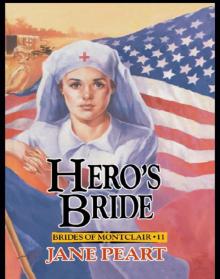 Hero's Bride
Hero's Bride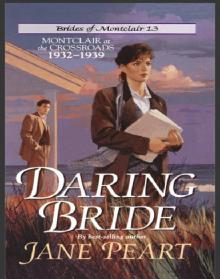 Daring Bride
Daring Bride Runaway Heart
Runaway Heart Promise of the Valley
Promise of the Valley Gallant Bride
Gallant Bride The Pledge, Value
The Pledge, Value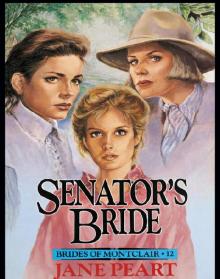 Senator's Bride
Senator's Bride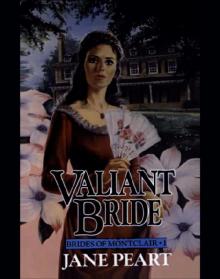 Valiant Bride
Valiant Bride Shadow Bride
Shadow Bride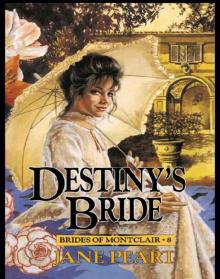 Destiny's Bride
Destiny's Bride A Tangled Web
A Tangled Web Folly's Bride
Folly's Bride The Promise
The Promise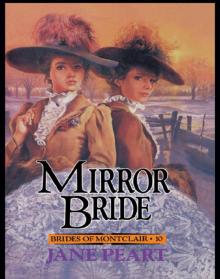 Mirror Bride
Mirror Bride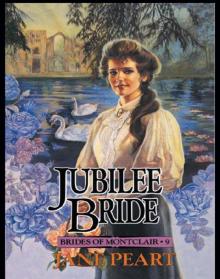 Jubilee Bride
Jubilee Bride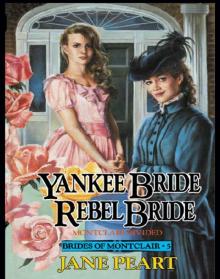 Yankee Bride / Rebel Bride
Yankee Bride / Rebel Bride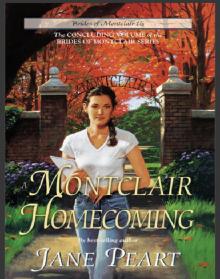 A Montclair Homecoming
A Montclair Homecoming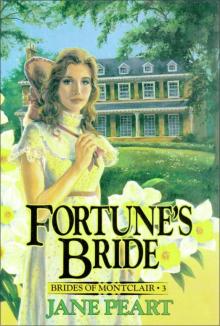 Fortune's Bride
Fortune's Bride Undaunted Spirit
Undaunted Spirit Love Takes Flight
Love Takes Flight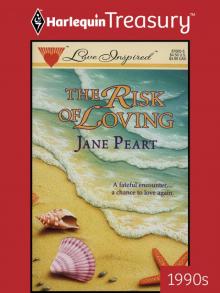 The Risk of Loving
The Risk of Loving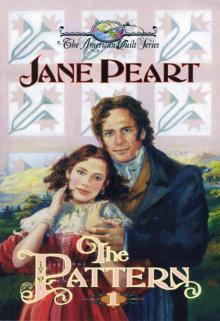 The Pattern
The Pattern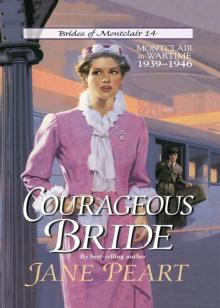 Courageous Bride
Courageous Bride